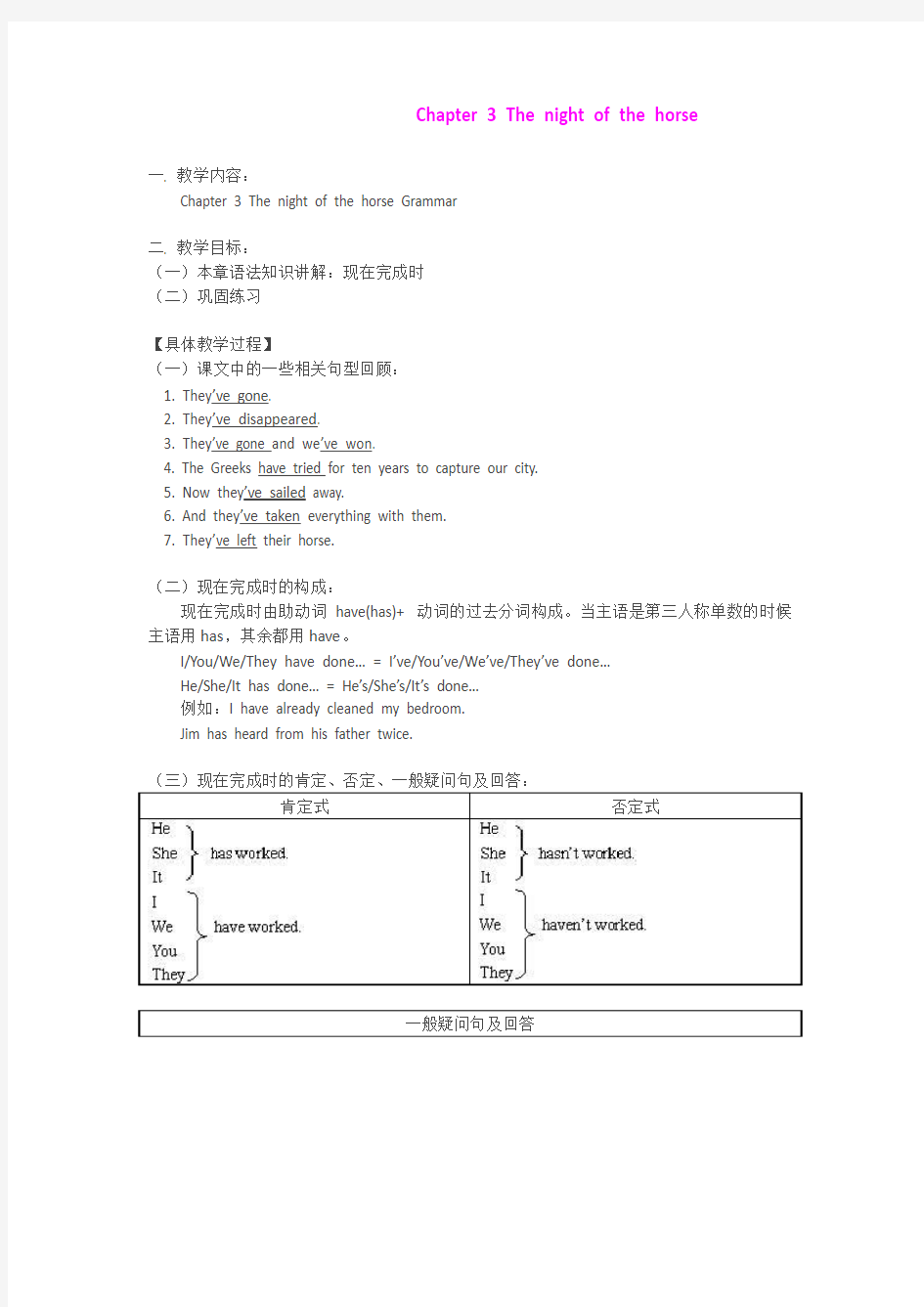1.4 Chapter 3 The night of the horse 教案(牛津上海版九年级上)


Chapter 3 The night of the horse
一. 教学内容:
Chapter 3 The night of the horse Grammar
二. 教学目标:
(一)本章语法知识讲解:现在完成时
(二)巩固练习
【具体教学过程】
(一)课文中的一些相关句型回顾:
1. They’ve gone.
2. They’ve disappeared.
3. They’ve gone and we’ve won.
4. The Greeks have tried for ten years to capture our city.
5. Now they’ve sailed away.
6. And they’ve taken everything with them.
7. They’ve left their horse.
(二)现在完成时的构成:
现在完成时由助动词have(has)+ 动词的过去分词构成。当主语是第三人称单数的时候主语用has,其余都用have。
I/You/We/They have done… = I’ve/You’ve/We’ve/They’ve done…
He/She/It has done… = He’s/She’s/It’s done…
例如:I have already cleaned my bedroom.
Jim has heard from his father twice.
(四)现在完成时的用法
1. 表示过去发生或已完成的某一动作对现在造成的影响或结果,着眼点是现在。常与短暂性动词如find, begin,go,see等连用。
例如:
--Lucy, have you found your ticket?
--Not yet.
He has just come back.
I haven’t finished my homework.
2. 表示过去已经开始,持续到现在的动作或状态,可以和表示从过去某一时刻延续到现在的一段时间的状语连用。常与延续性动词连用,如be,work,study,live等。
-- Do you know Jack well?
-- Certainly. We have been friends since ten years ago.
I have lived here for ten years.
下面说一下规则动词过去分词-ed的读音,只需牢记以下三条规则:
1) 在/t/, /d/后,读/id/。
例如:start-started /`sta:tid/,need-needed /`ni:did/
2) 在/p/, /k/, /f/, /t/, /t/, /s/,等清辅音的后面发/t/。
例如:stop-stopped /st pt/, look-looked /lukt/, laugh-laughed /la:ft/, watch-watched /w t t/, fish-fished /fI t/, notice-noticed /`n utist/
3) 其它情况下一律发/d/。
例如:answer-answered /`a:ns d/, live-lived /livd/
(五)现在完成时中的时间状语:
现在完成时中的时间状语有: already, yet, just, before, recently, still, never , ever, so far, up to now, since…, for…,in/for the past few years等。
1. already/ yet
already 用于肯定句,yet 用于否定句和疑问句。
I have already had lunch. I had it at 11:30.
(表示我已经吃过午饭,现在不饿了)
I haven’t had lunch yet.
(表示我午饭还没吃,我现在很饿)
Page 40 B:
Hans: Hello,Eric. We will definitely come to see you next month.
Eric: I am glad to hear it ___________ you __________(get) your air tickets __________(already/yet)?
Hans: I _________ ___________ _________ (get, already/yet) mine, but Anna_________ ______ ___________(not get) hers _________ (already/yet).
Eric: Why is that?
Hans: She___________ _______ _____________(not save) enough money__________ (already/yet). She will buy it next week. She is very excited about the trip. She _________ ________________ ____________(pack, already/yet) her suitcase. I __________ __________ _______________(not pack) mine ____________(already/yet).
2. ever/never
ever (at any time) 常用于问句中, never (not at any time) 表示否定意思。
Have you ever visited Shanghai?
Yes, I have.
No, I have never visited it.
3. since/for
since “自从……”,接时间点,表示某动作或状态从过去某个时间开始,一直延续到现在并且有可能仍将延续下去。for接时间段,表示某动作或状态持续了多久。主句表示动作或状态的动词通常是延续性动词。如:
He has worked in this school since 1999/June/he came to Nanjing.
He has worked in this school for 5 years/ six months/ a long time.
Page 42 D1:
1. Where does Hans live?
He __________ in ________________________.
2. How long has he lived in Hamburg?
He _________ ________________ there ___________ _______________.
3. How long has Doris lived in Shanghai?
She _________ ____________ here_________ _______________ ____________.
4. Where does Doris born?
She _________ __________ ____________ ______________________.
(六)have been to和have gone to 的区别
have been to的意思是“去过某地”,表示曾经去过某地现在已经回来,人在说话地。
have gone to的意思是“去了某地”,表示人在去那里的途中或已经在那里。
例如:
---Where have you been? 你去哪里了?
---I have been to the zoo. 我去动物园了。(说话人不在动物园了)
My brother has gone to the zoo. 我哥哥去动物园了。(人在去动物园的途中或已经在动物园)
(七)现在完成时和一般过去时的区别:
1)现在完成时与现在有联系,它表示过去的动作对现在所产生的结果、影响。一般过去时通常表示在过去某一具体时间发生的动作,与现在没什么联系。
2)现在完成时表示过去延续到现在的行为;一般过去时着重过去某一时刻的某一具体动作。因此含有特指过去某一个时间的时间状语只能用一般过去时,而不用现在完成时。如:---Have you had your lunch?
--- Yes, I have.
